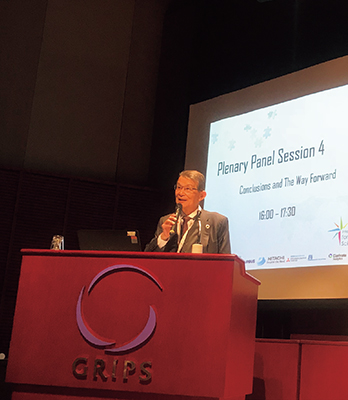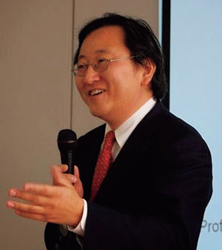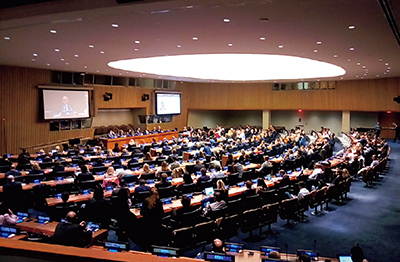Diplomatic Bluebook 2019
Chapter 3
Japan's Foreign Policy to Promote National and Global Interests
3 Science and Technology Diplomacy
Science and technology constitute the foundational elements for peace and prosperity that support socioeconomic development, and play a vital role in ensuring safety and security. By harnessing its own advanced science and technology, Japan promotes science and technology diplomacy, thereby contributing to the development of science and technology at home and abroad, the promotion of relations with other countries, the peace and stability of the international community, and the resolution of global challenges. As part of this effort Japan places emphasis on initiatives implemented through the activities of the Science and Technology Advisor to the Minister for Foreign Affairs.
Prof. Teruo Kishi (Science and Technology Advisor to the Minister for Foreign Affairs) supports the activities of the Foreign Minister from the perspective of science and technology, and provides advice on the utilization of science and technology in the planning and coordination of various foreign policies to the Minister and relevant divisions. He also takes part in public relations activities concerning Japan's science and technology capabilities, while strengthening partnerships with Japanese and foreign stakeholders in the fields of science and technology.
In 2018, the Advisory Board for the Promotion of Science and Technology Diplomacy, chaired by Prof. Kishi, as well as Study Group Meetings were held. As a result of these discussions, recommendations on the utilization of science and technology on the Arctic, under the Advisory Board for the Promotion of Science and Technology Diplomacy, were submitted by Prof. Kishi to State Minister for Foreign Affairs Nakane in March. In May, he also submitted the Recommendation on Science, Technology and Innovation (STI) to Achieve the SDGs and its Guiding Tool, the STI Roadmap, as the means for that, to State Minister for Foreign Affairs Nakane.
In June, Prof. Kishi took the rostrum as a panelist in the Third STI Forum5, where he presented Japan's initiatives based on the recommendations related to the STI roadmap as well as the Recommendation for the Future, which was drawn up in 2017, toward the implementation of the SDGs. He also proposed to formulate an STI roadmap by each country.
Furthermore, Prof. Kishi has also implemented a project to publicize science, technology and innovation through cooperation with the Cabinet Office and MOFA in various countries6, with the aim of enhancing Japan's capability of disseminating information about its prominent scientific and technological strength. The project was implemented in Qatar in November, and he discussed the potential for future cooperation with the relevant organizations and researchers from Qatar.
The Advisor also attends various international conferences alongside with the science and technology advisors of other countries including the U.S., the UK, and New Zealand, where he engages in exchanges of opinions, and strives to build and strengthen networks. The Advisor widely publicizes Japan's efforts in science and technology diplomacy at various fora in Japan and abroad. He attended the Foreign Ministries Science and Technology Advisors Network (FMSTAN) and International Network for Government Science Advice (INGSA) held in Japan in November, where he delivered lectures on Japan's science and technology diplomacy efforts. To raise the level of knowledge within MOFA, science and technology diplomacy seminars are also held periodically.
 International Network for Government Science Advice (INGSA) (November 6 and 7, Tokyo)
International Network for Government Science Advice (INGSA) (November 6 and 7, Tokyo)Japan has concluded 32 science and technology cooperation agreements, and these are now in force with 46 countries and the EU7. Based on these agreements, it organizes regular joint committee meetings with these countries to engage in intergovernmental dialogue. In 2018, joint committee meetings were held with the Czech Republic, Israel, Switzerland, New Zealand, Romania, Russia, Singapore, Norway, China, and Sweden respectively. Attended by delegates from the relevant ministries and institutions, consultations were held on the current status of cooperation in diverse sectors, and on the future direction of cooperation, contributing to promoting science and technology exchange.
With regard to multilateral cooperation, as a member of the Board of the International Science and Technology Center (ISTC) that supports research for peaceful purposes conducted by researchers on weapons of mass destruction from the former Soviet Union, Japan works together with the U.S. and the EU to provide support mainly to countries of Central Asia. Japan also participates in ITER projects to demonstrate the scientific and technological feasibility of nuclear fusion energy.
- 5 UN Multi-stakeholder Forum on Science, Technology and Innovation for the SDGs, held at the UN Headquarters in New York on June 5 and 6, 2018.
- 6 Project (known as “SIP Caravan”) to introduce the SIP (Strategic Innovation Promotion Program), which is a new type of Japanese national project for science, technology and innovation, spearheaded by the Council for Science, Technology and Innovation (CSTI) as it exercises its headquarters function to accomplish its role in leading science, technology and innovation beyond the framework of government ministries and traditional disciplines by facilitating coordination among government, industry and academic entities under 11 themes, in order to lay the groundwork for future international cooperation, as well as for the international dissemination of Japan's research and development output, through cooperation with the Ministry of Foreign Affairs (diplomatic missions overseas).
- 7 The Japan-USSR Science and Technology Cooperation Agreement was succeeded by Kazakhstan, Kyrgyz Republic, Uzbekistan, Armenia, Georgia, Ukraine, Belarus, Moldova, Turkmenistan, and Tajikistan on different dates. The Japan-Czechoslovakia Science and Technology Cooperation Arrangement was succeeded by individual agreements with the Czech Republic and Slovakia in 1993. The Japan-Yugoslavia Science and Technology Cooperation Agreement was succeeded by individual agreements with Croatia, Slovenia, Macedonia (country name at the time), Serbia, Bosnia and Herzegovina, and Montenegro on different dates.
Dr. Toshiya Hoshino, Ambassador,
Deputy Permanent Representative of Japan to the United Nations

I was a professor at a university teaching United Nations diplomacy when I was appointed Ambassador and Deputy Permanent Representative of Japan to the United Nations in New York in the summer of 2017. On June 5 and 6, 2018, I had the opportunity to co-chair the 3rd UN STI Forum1 held at UN Headquarters with Mr. Sandoval, Ambassador and Deputy Permanent Representative of Mexico. The STI Forum brings together governments, scientists, the business community, civil society, and entrepreneurs to discuss the promotion and use of science, technology and innovation (STI) to achieve the Sustainable Development Goals (SDGs) set by the UN.
Why is STI important now? The SDGs, which were adopted by the UN in 2015 with the slogan, “Leave no one behind,” is a master plan that aims to achieve a sustainable society worldwide by the year 2030. As part of the initiatives to achieve the SDGs, STI could serve as a trump card that would optimize and expand finite resources. One example is electricity. It is said that even today, roughly 20% of the world's population lives without electricity. In these areas, efforts are being made to place solar panels on top of kiosks scattered around villages and to lend out LED lights that can be used for longer hours with less power, replacing firewood and kerosene lamps. With this improved lighting, children are relieved of the burden of carrying firewood and are able to spend more time on their education and with family at home. In towns, new business opportunities for local residents have opened up. This is a clear example of the power of science and technology literally “lighting up” and improving the quality of people's lives.
In this way, science and technology aid in the realization of a sustainable society. However, for many people, “STI for SDGs” is not a familiar concept or experience yet. Japan, a nation founded on science and technology, can contribute in many ways. My goal as co-chair of the STI Forum was to make the forum concrete and action-oriented, while providing Japan's leadership.
Japan is advocating for a human-centered vision of a future society, “Society 5.0”, and working on resolving social issues through the practical applications of STI. Meanwhile, it is important that countries around the world formulate initiatives to achieve the SDGs in accordance with their own circumstances and incorporate them into their national development strategies. However, such efforts will be ineffective if countries and stakeholders around the world only work independently. If there were a roadmap (progress schedule) for people to work together toward common goals, we would be able to implement more systematic efforts and thereby achieve shared progress and results. In line with this thinking, at the 3rd STI Forum, which was attended by about 1,000 participants from various sectors, Prof. Teruo Kishi, Science and Technology Advisor to the Minister for Foreign Affairs of Japan, proposed the formulation of an ‘STI Roadmap' that visualizes ways forward for each country to utilize STI as a means to further develop the SDGs. This proposal received strong support. I realized through this experience that the international community truly needs Japan's intellectual leadership.
 3rd UN STI Forum (June 5-6, New York, U.S.)
3rd UN STI Forum (June 5-6, New York, U.S.)In drawing up this roadmap, it is hoped that Japan will lead the way for other nations. Japan is expected to leverage its presidency of the G20 Osaka Summit on Financial Markets and the World Economy and the Seventh Tokyo International Conference on African Development (TICAD7) in 2019 to contribute to the international community. Japan has a major role to play in expanding “STI for SDGs” on a global scale and realizing a world where no one is left behind.
- 1 Multi-stakeholder Forum on Science, Technology and Innovation (STI) for the Sustainable Development Goals (SDGs)

